
Last modified: 2014-06-14 by ian macdonald
Keywords: canton: national flag | tree (blue) | lion | monkey | leopard | no1 | man | elephant | trap | lion | shark | nº3 | cactus: prickly pear | soldier | water bearer | taysec co no 1 first choice | men: 4 | men: 8 |
Links: FOTW homepage |
search |
disclaimer and copyright |
write us |
mirrors
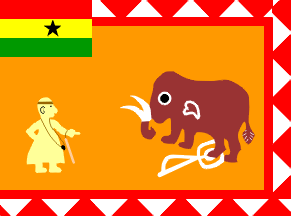 image by António Martins, 23 August 2005
image by António Martins, 23 August 2005
This one is from the Smithsonian Institution / Textile Museum, shown on line. The Smithsonian webpage suggests that this flag illustrates the saying «When an elephant steps on a trap, no more trap», which may be taken from Adler & Barnard’s book [adb92]. The color shades of this flag seem well-preserved, but the photo is a bit dark.
It is mainly orange with a red edging separating the background from the border, which covers all three free edges. This border is white with red triangles pointing outwards. The flag shows a large brown elephant, facing the hoist, stepping on a white trap with its right hind leg. At the hoist, a man in profile, with light yellow complexion and robe, adorned with a headband and a long necklace with a dark pendant, and with a walking can hanging from his left wrist, faces the elephant and points to him with the index finger of his half-raised left arm, and with his right hand at the waist. The canton shows a Ghanaian national flag, thus dating this flag of after 1957 (but not from 1964-1966); the star is slightly off-centered to the fly. White fringe on all three free edges; white cloth sleeve at the hoist, with white tie ribbons on both ends.
António Martins, 23 August 2005
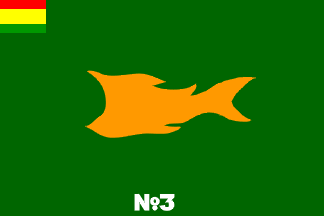 image by António Martins, May 2004
image by António Martins, May 2004
I am an avid collector of Fante Asafo flags from Ghana. I have one with
a basking shark image, which does not exist off the coast of Ghana: The flag
is quite simple, but it is also quite large and if that isn’t a Basking
Shark I can’t imagine what it is. (I have one other flag that uses a
shark as a symbol but it is just a regular shark — eating a rival
company member, of course!)
Steve Messick, 08 January 2002
It’s a dark green flag with a smallish canton with the
Ghanaian national flag (note the two shades of
green!), without the black star and with broader yellow stripe, and
a large solid outline of a shark, facing the hoist, in orange on the
center; centered at the bottom the lettering "Nº3" set in white.
António Martins, 26 May 2004
The drawing is pretty stylized, as should be, flagwise, but it looks
like a Rhincodon typus (the fins are not entirely correct, though:
there’s a ventral fin missing, right below the second dorsal fin; also,
the first dorsal should be noticeably larger than is shown on the flag
— but its a good approximation).
Jorge Candeias, 09 January 2002
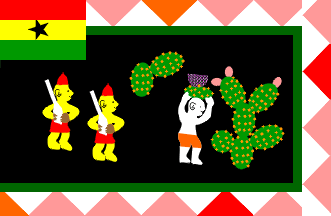 image by António Martins, 22 August 2005
image by António Martins, 22 August 2005
This one is from the Smithsonian Institution / Textile Museum, shown on line. The Smithsonian webpage suggests that this flag illustrates the saying «We can carry water in a basket using a cactus as a head cushion», which boasts daring and prowess, probably taken from Adler & Barnard’s book [adb92]. The color shades of this flag suggest some sun-fading.
It is mainly black with a dark green edging separating the background from the border, wich covers all three free edges. This border is white with pink triangles pointing inwards: 5+½ at the bottom, 4 at the top (leaving room for the canton), and 4 at the fly. Of these triangles, four are not pink, two being red and another two orange.
The flag shows two soldiers in profile, dressed in red shorts and caps, holding with brown gloved hands each a white gun at the shoulder, their complexion yellow, beholding a man, of white complexion, dressed with orange shorts, who carries a white and purple water vessel (basket?) on his head, cushioning it with a cactus (a prickly pear) leave. Two prickly pear plants are visible, the larger one at the fly, with six segments and three flowers, and a smaller one with only two segments.
The canton shows a Ghanaian national flag, thus dating this flag of after 1957 (but not from 1964-1966); the star points to the hoist and is slightly off-centered to the hoist. White fringe on all three free edges; white cloth sleave at the hoist, with white tie ribbons on both ends.
António Martins, 22 August 2005
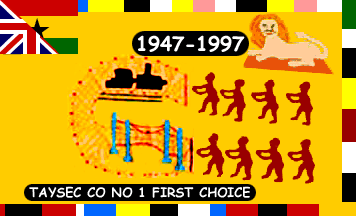 image by António Martins, 04 August 2004
image by António Martins, 04 August 2004
To create the Taysec “Asafo Company Nº1” flag, the flag
makers of the Fante Region have taken the
Taysec corporate logo and translated
it within the context of the art of the Asafo warrior tradition. The lion
represents the strongest animal — the king of the jungle — and,
as such, the great protector. The Asafo company protects its interests and
the interests of those dependent upon it. The two teams of four fishermen
drawing in the drag-net symbolise the power of pulling together, as reflected
in Ghana’s Independence maxim, «Strength in
Unity», and in Taylor Woodrow’s strong team culture.
The drag-net has turned up a catch of technological images to signifying the
ability of the company to catch the biggest prize and overcome its rivals.
The split Ghana and Union
flags refer to Taysec’s Anglo-Ghanian origins and the strong partnership
between Britain and Ghana.
Dov Gutterman, 27 May 2002,
quoting from
Taysec
website
Some would say that this text is too heavy on the advertisement side, but it certainly does so while explaining the flag symbolism. The quoted page is now 404 (page removed) and the main address of Taysec.GH redirects to the Taylor Woodrow Ghana welcome page, where it is said:
Although locally incorporated and with its own Board of Directors, Taysec is a 100% owned subsidiary of the Taylor Woodrow plc, one of the leading housing and property company’s in UK and North America.
This explains the Taylor Woodrow reference above. The mentioned Taysec corporate logo seems to be Taylor Woodrow’s also, for their site mentions «the four-figure logo. All trademarks and servicemarks included in this web site belong »…« to »…« or have been licensed »by« Taylor Woodrow»
António Martins, 03 June 2004
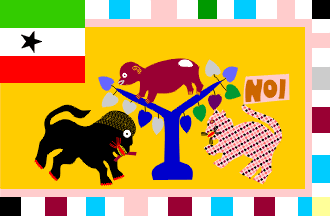 image by António Martins, 04 October 2005
image by António Martins, 04 October 2005
This is one of the newly changed item pages of the Adire Textile company website. Adire lists this as ASF169 and sells it for US$395. It also says «© Duncan Clarke, Version 5/30/2005», which is the authorship of the photo; as usual, no word about location or date of the purchase nor the name of its maker. According to this page this is a «Charming 1960s flag with a lion, leopard, and another animal around a colourful tree» and it is in good condition. Measurements are 59×37″ = 150×93 cm (including the fringe).
It is a typical asafo company flag with a dark yellow background showing a stylized tree and three animals. The tree consists of a central trunk and two branches, forming an "Y"-shape; trunk and branches are dark blue. Heart shaped leaves grow rom the tips and lower edge of each branch (six in the hoist side one, seven in the other), each in a different color and hanging from thin black stalks.
Perched on the nook of the tree, a pig-like brown animal, facing the hoist, with simian head and a large white spot in its left quarter. Under the tree and facing it, at the hoist side, a black lion, with its mane shaved to a yellow stubble (‼), red claws, large white eye, and holding in its mouth what seems to be the (severed) tail of the animal up on the tree. Under the tree and facing it, at the fly side, a polka dot leopard, its hide pale pink patterned in rows of black and brown, and then pink and purple, dots, not staggered and slanted about mid quadrant; small brown eye and visible whiskers. Above the leopard, a pink panel, slightly slanted, with thick brown letters reading "NO1".
Wide border on al three free edges, excluding the canton, made of alternating colored and white squares (namely black, brown, light blue, pink, brown, blue, brown, light blue, pale yellow, light blue, brown, grey, pink, black, pink, light blue, green, pink and lihgt blue; clockwise from the lower hoist), separated from the main flag area by a pink stripe.
Squarish tricolor canton with horizontal stripes of light green, white and red, with a black five-pointed star pointing to the fly. This is obviously the Ghanaian national flag as of 1964-1966 (though turned upside down), which allows for a relatively narrow dating of this flag. The star is set off to the hoist which, along with the square canton for a 2:3 flag, may imply that the canton was originally meant to cover also the are covered by the (white) hoist sleeve.
António Martins, 04 October 2005